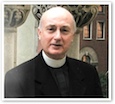Paying the piper
- FATHER GEORGE W. RUTLER
"He who pays the piper calls the tune" is a saying based on the Scottish custom of having the lord of the manor choose the music for which he was paying.
 Sometimes in lieu of money, the piper was given a dram of whisky in a bowl called a "quaich" (pronounced "quake"), and the liquor was often referred to as "lucre." If you are in someone's pay, he will tell you what to do.
Sometimes in lieu of money, the piper was given a dram of whisky in a bowl called a "quaich" (pronounced "quake"), and the liquor was often referred to as "lucre." If you are in someone's pay, he will tell you what to do.
This has long been a challenge when the Church accepts the patronage of a civil ruler. St. Athanasius and St. John Chrysostom stood up to such emperors as Julian the Apostate and Theodosius, who were outspoken in what they thought was their right to call the tune. After the Great Schism, the Byzantine Church had an even greater problem with this "Caesaropapism" since it no longer had a protector in the Pope. And the problem pertains even today in the new post-Soviet Russian government. In the West as well, St. Ambrose and St. Hilary of Poitiers had to face down civil rulers. Pope Gregory VII kept the Emperor Henry IV waiting in the snow. Pius VI and VII fared worse with the Emperor Napoleon.
In the eighteenth century the Holy Roman Emperor Joseph II was called the "Sacristan of Europe" because, although he was something of a religious skeptic, he regulated all the details of worship, even to the design of candlesticks, and censored the contents of sermons. In this he was something like Annise Parker, the mayor of Houston, who caused a stir recently with her subpoena of the sermons of five local clergymen on the grounds that Christian expressions might violate the city's Equal Rights Ordinance. The Emperor Joseph II might have admired her moxy, although the protocols of his court would have been confused if she had visited with the woman she calls her "wife." The Texas Attorney General called her subpoena "a direct assault on the religious liberty granted by the First Amendment."
There is a logic to governments giving grants to charities run by religious institutions, since they run the charities more efficiently than the government. In two recent years Catholic Church agencies received 1.5 billion dollars in grants. But the piper may call the tune. Some Catholic hospitals already have had to close rather than do the government's dance. Consider a case in Idaho, where city officials have told clergymen that they must officiate at same-sex weddings, or face fines of $1,000 a day and time in jail. Then there is the neuralgic fact of tax exemptions. Chief Justice John Marshall's decision in McCulloch v. Maryland (1819) paraphrased the defense of Daniel Webster: "The power to tax is the power to destroy."
It all boils down to rendering unto Caesar and unto God. Christ expected the Pharisees of his day to know the difference. He expects the same of us.
 This is Meaghen Gonzalez, Editor of CERC. I hope you appreciated this piece. We curate these articles especially for believers like you.
This is Meaghen Gonzalez, Editor of CERC. I hope you appreciated this piece. We curate these articles especially for believers like you.
Please show your appreciation by making a $3 donation. CERC is entirely reader supported.

Acknowledgement
 Father George W. Rutler. "Paying the piper." From the Pastor (October 26, 2014).
Father George W. Rutler. "Paying the piper." From the Pastor (October 26, 2014).
Reprinted with permission of Father George W. Rutler.
The Author
 Father George W. Rutler is the pastor of St. Michael's church in New York City. He has written many books, including: The Wit and Wisdom of Father George Rutler, The Stories of Hymns, Hints of Heaven: The Parables of Christ and What They Mean for You, Principalities and Powers: Spiritual Combat 1942-1943, Cloud of Witnesses — Dead People I Knew When They Were Alive, Coincidentally: Unserious Reflections on Trivial Connections, A Crisis of Saints: Essays on People and Principles, Brightest and Best, and Adam Danced: The Cross and the Seven Deadly Sins.
Father George W. Rutler is the pastor of St. Michael's church in New York City. He has written many books, including: The Wit and Wisdom of Father George Rutler, The Stories of Hymns, Hints of Heaven: The Parables of Christ and What They Mean for You, Principalities and Powers: Spiritual Combat 1942-1943, Cloud of Witnesses — Dead People I Knew When They Were Alive, Coincidentally: Unserious Reflections on Trivial Connections, A Crisis of Saints: Essays on People and Principles, Brightest and Best, and Adam Danced: The Cross and the Seven Deadly Sins.




